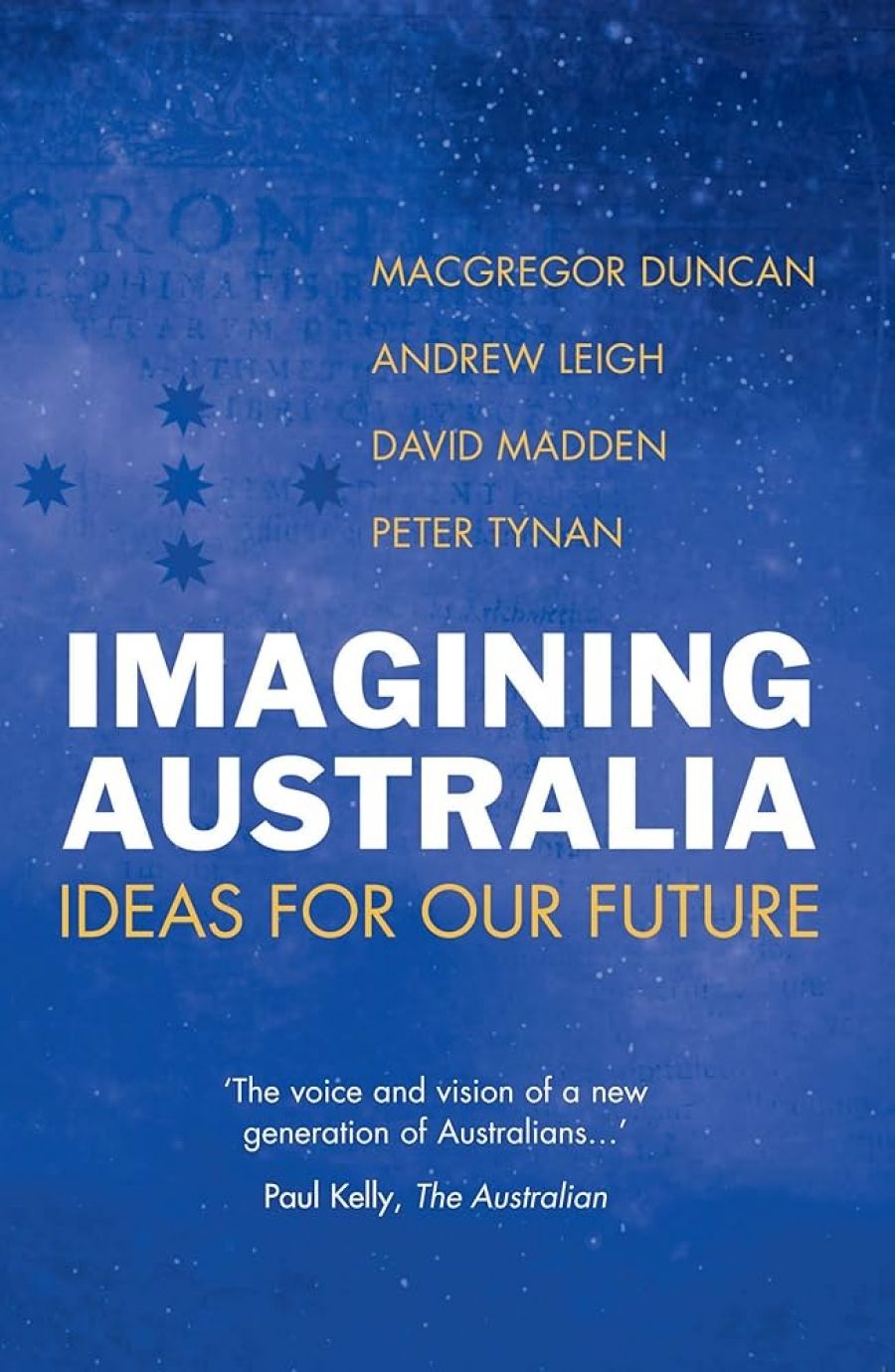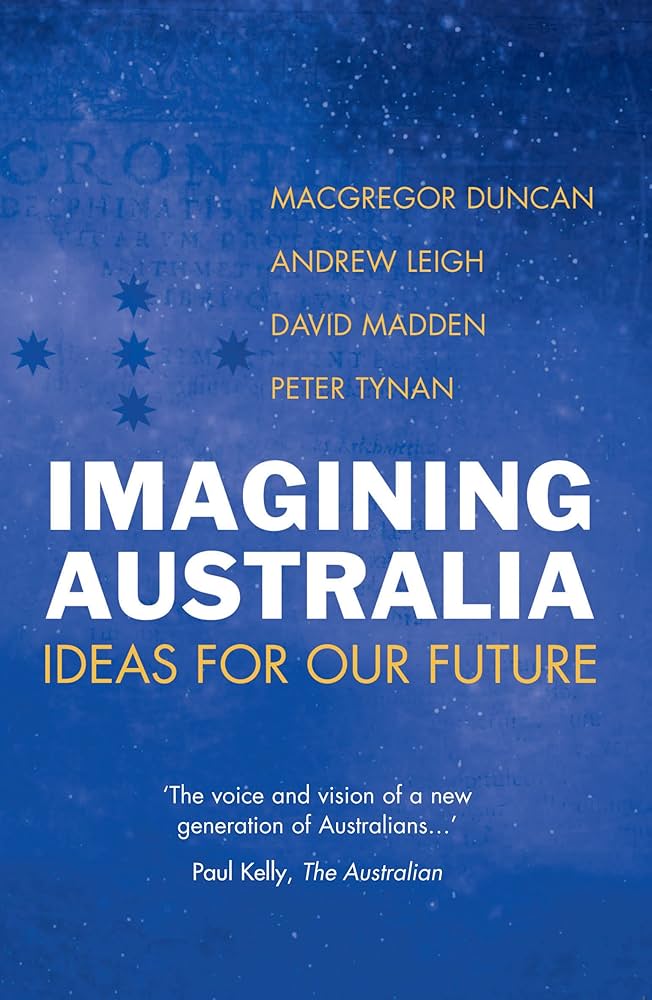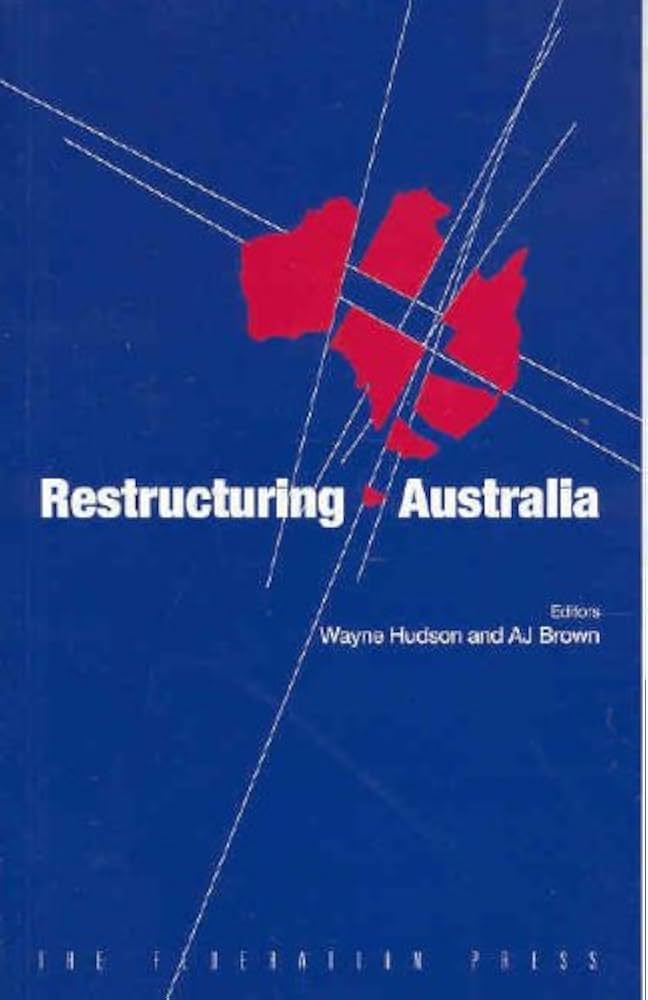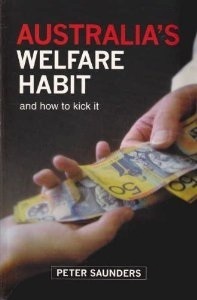
- Free Article: No
- Contents Category: Society
- Review Article: Yes
- Article Title: The Full Gaunt
- Online Only: No
- Custom Highlight Text:
Though reviewing books is a humble enough task, it frequently leads to elevated thinking. As I read these books, it occurred to me that, perhaps, unwittingly, they pointed to the ambiguous legacies of the Enlightenment. One of those legacies is found in the conventional political distinction drawn between ‘left’ and ‘right’; the other concerns the role of the expert.
- Book 1 Title: Imagining Australia
- Book 1 Subtitle: Ideas for our future
- Book 1 Biblio: Allen & Unwin, $24.95 pb, 324 pp
- Book 1 Cover Small (400 x 600):

- Book 1 Cover (800 x 1200):

- Book 2 Title: Restructuring Australia
- Book 2 Subtitle: Regionalism, Rebuplicanism and Reform of the Nation-State
- Book 2 Biblio: Federation Press, $39.95 pb, 241 pp
- Book 2 Cover Small (400 x 600):

- Book 2 Cover (800 x 1200):

- Book 3 Title: Australia's Welfare Habit
- Book 3 Subtitle: And how to kick it
- Book 3 Biblio: Duffy & Snellgrove, $33 pb, 267 pp
- Book 3 Cover Small (400 x 600):

- Book 3 Cover (800 x 1200):

Granting the simplifications involved, there is sufficient merit to the proposition that, if the struggle between left and right once structured political and intellectual debate, it is less than clear now how we should represent that debate.
Firstly, an unstable coalescence of economic liberalism and conservative social and political ideas is currently enjoying its moment in the sun. The kind of ideas promoted by Peter Saunders, from the Centre for Independent Studies (CIS), enjoy a measure of intellectual authority and policy influence within the Liberal party. For the time being, this coalition of neo-conservatives and economic liberals have put whoever opposes them onto the back foot by claiming to be the very expression of modern progressive and dynamic ideas, making the ‘old Left’ seem like dinosaurs.
This dynamic helps to explain the evolution of ‘Third Way’ politics found in today’s Labor Party, and on display in the book co-authored by Macgregor Duncan, Andrew Leigh, David Madden and Peter Tynan. Third Wayism is a mush of ideas characterised mostly by a relentless upbeat ‘positivity’ usually associated with public relations consultants. There are many problems with Third Way politics. It is a politics that point tacitly to the effectiveness of neo-con activists such as Saunders. Third Wayism promotes policies barely distinguishable from whatever is on offer from the Liberal-National Coalition. As Australia readies itself for a federal election, we can say, adapting Dorothy Parker, that the Coalition and the ALP offer the full gamut of policies from A to B. (The one key policy distinction currently seems to be that Latham wants parents to read to their children – and Howard doesn’t.) Latham’s attempt to ape Howard’s ‘leaping back to the future’ policy agenda suggests that there is little support for appealing to an idea of history going anywhere – except backwards.
All of these thoughts were provoked by reading this slew of books, which ostensibly offer new ideas about our future. Do these books inspire confidence that there will be a future worth having? Any judgment about this depends on how we assess the other ambiguous legacy of the Enlightenment: the modern expert.
Most societies have had them. They have been called shamans, prophets, diviners, oracles or witch doctors. Their favoured methods have included exploring the viscera of dead chooks, inhaling intoxicants or listening to trees. We now refer to, and too often defer to, the contemporary version of these folk: experts. They have thrown away the chicken guts in the relentless pursuit of ideas. Some are ‘bright ideas’, and some are good ideas. (Bright ideas have a certain technical allure but little, if any, deep ethical or human value. Think of bright ideas such as eugenics, nuclear weapons, ‘social capital’, TQM and ‘evidence-based policy’.) Experts themselves are neither bright ideas nor good ideas. They just are.
In these three books, there are twenty-two experts and a hatch of their ideas on display. lf we were to take these authors as representative of the expert, we would be forced to conclude that experts are mostly legal blokes in their fifties. The authors include twelve professors, many more lawyers – and only two women.
I had reached first for the book by Duncan et al. This book seemed promising. The authors were not in their fifties, and they had backgrounds in public policy-making. That it was a co-authored text held out the possibility of a degree of coherence. I was also seduced by the fact that eminences such as Phillip Adams and Peter Garrett had supplied puffs. (Like book reviewers, puffers should be required to read the book they endorse.) l should have known better.
My jaw dropped when I read that ‘this is not a book about Australian politics. lt is a book about the future of our country and how we can realize it.’ Call me old-fashioned, but I believe that if we are to think well about our present and future circumstances, we need to start with the premise that politics matters deeply. I cannot, therefore, take seriously anyone who declares that our rendezvous with the future will somehow bypass politics. Making change is a deeply political process. It requires a near-visceral recognition that the greatest obstacle to change is the way things already are. If change is to occur, it is a deeply practical matter requiring, as Hannah Arendt reminded us tirelessly, that we need to think what we do.
‘New’ ideas come thick and fast in this book. But the poverty of thinking on offer is evident in the first chapter on ‘Australian National Identity’. There we are told that ‘there is something refreshing about the Australian national identity’, but also ‘[t]oday many Australians feel that there is an emptiness to Australian national identity’. The solution? ‘All nations require a vibrant and relevant national story.’ This is what the authors proceed to supply. The underlying analysis of the way things are and why they are the way they are is largely incoherent. I am not suggesting that the many specific new ideas – like adopting a dual system of place names that incorporates indigenous and Anglo-Celtic names as a contribution to reconciliation – are all bad. It is just irresponsible, because it is not connected to the current politics of recognition engaged in by indigenous communities.
Restructuring Australia, edited by Wayne Hudson and A.J. Brown, makes up for this shotgun approach to generating bright ideas by proposing a few big ideas about constitutional reform. This involves introducing a new kind of regional governance, adopting a republican constitution and working out what it means to be a nation-state in a globalising context. Since most of the writers are academics, there is not a strong sense of the political. The idea of creating a new kind of governance based on regions, for example, is an inherently rational and attractive idea, especially if it were to mean replacing both local and state governments. It also has no social or political base of support. Therefore, it has a snowball in hell’s chance of being taken seriously.
If the stable of experts in the first two books look confidently towards the New, Saunders looks no less relentlessly backwards, while performing the by now familiar ‘neo-con’ stunt of leaping ‘back to the future’. His book combines a mass of empirical data yoked to a feisty prose style deployed in the service of a deeply objectionable politics. For Saunders seeks nothing less than the demise of the current ‘welfare state’. He claims that the Australian welfare state is a middleclass plot mobilising a politics of envy to legitimate a shoddy system of services. He says that the modern welfare state erodes self-reliance while promoting social problems such as ‘welfare dependency’, unemployment, poverty, crime, drug use, illegitimacy and broken families.
It is hard to believe that Saunders’ inherently contradictory sludge of ‘economic liberal’ ideas and deeply illiberal neo-conservative moral and social positions can last long. Saunders claims to be a liberal. He is not. His ethic of individualist self-reliance is embedded in a neo-conservative framework. The result is ethically thin. He cannot sustain the ethical basis of his bright idea (‘abolish the welfare state’) because he nowhere either spells out or defends the ostensibly ‘liberal’ basis of his own ethical position.
He asserts that it is ‘immoral’ for welfare recipients to receive aid from government welfare agencies. Saunders argues that we know this to be so because people who take government aid experience things like shame, alienation and stigma, and also feel disempowered. He asserts, as if it were a self-evident truth, that ‘dependence’ is a very bad thing. Does this mean that all persons who are caught up in anything like a dependent relationship – such as children who ask for something from their parents, a student who is dependent on a teacher, or any adult who is bedridden and dependent on the care of another adult – are caught up in shameful relationships?
Saunders fails to understand or to accept the ethical obligations of the liberal regard for ‘negative freedom’ and ‘positive freedom’. True liberals rightly critique excessive state interference in human lives when governments snoop or abuse their power to coerce citizens. Saunders sees no problem when this is done to unemployed and low-income Australians who try to access income support.
No less serious is Saunders’ failure to address the properly liberal interest in securing or promoting ‘positive freedom’, understood as the capacity of people to do those things that secure happiness or a flourishing life. Saunders has failed adequately to outline or defend his ‘liberal’ attack on the modern welfare state. This, of course, means nothing in the current political context. He has written a book that will be taken seriously by the policy elite.
This reminds us of the malaise at work in our intellectual and political culture. The real challenge Australians face is this: we live in a period when simplified political postures or a quasi-theological story about progress are not available. Thus the capacity to constitute a political culture based on discussion, uncertainty and complexity is more necessary than it has been for some time. While acknowledging the contemporary dominance of neo-conservatism and economic liberalism, this in no way requires that we accept the ‘death of politics’ thesis promoted by ‘public choice theorists’ such as Saunders. Certainly, there is no clarity, let alone a story able to generate widespread popular support for whatever is meant by talk of a left or progressive standpoint. Yet a politics that speaks ‘truth to power’ is still very much alive and well. It is found at work in Green politics, women’s activism, antiglobalisation movements and a variety of human rights and peace campaigns. These offer a politics of opposition while holding out the promise of a recrafting of our social and political fabric. Alain Touraine has argued since the 1960s that these social movements will continue to be the most fertile source of long-term change. This is so because most of the people who make up social movements understand that change is a practical issue and not a matter simply of academic speculation – or upbeat advertising.


Comments powered by CComment